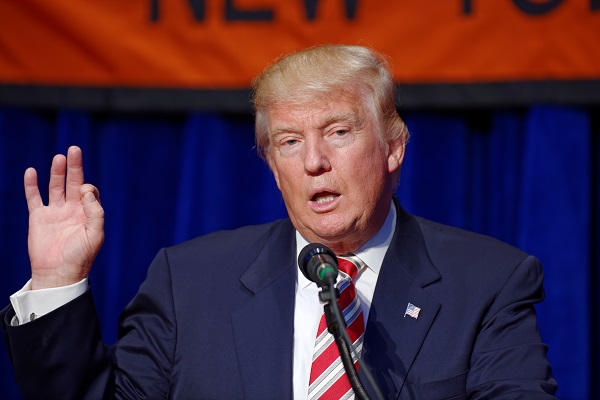
Trump Wants to Ban Anti-Semites From Entering U.S.
- By Elisa Meyer --
- 26 Aug 2016 --

Trump outlined a new proposal for an ideological screening test for “extreme vetting.”
The 2016 Republican nominee for President of the U.S., Donald Trump presented a proposal to the American public that would effectively ban anti-Semites from entering the country. Trump was speaking in Youngstown, Ohio when he outlined his new proposal. He said, “In the Cold War, we had an ideological screening test. The time is overdue to develop a new screening test for the threats we face today. I call it extreme vetting. I call it extreme, extreme vetting.”
Trump Wants to Ban Anti-Semites From Entering U.S.[/tweetthis]
The proposal is not without precedent, which is why Trump was alluding to the ideological screening tests that were ubiquitous during the Cold War, preventing communist leaning people from entering the country. Jewish groups also attempted to have broad bans placed on anyone with Nazi connections or sympathies.
The proposal to ban anti-Semites from entering the country comes in the wake of terrorist attacks by extremists in several countries all over the world, notably France which has seen a dramatic increase in terrorism fueled attacks since 2015. Trump echoed this sentiment while selling his pitch for a ban on anyone found to be anti-Semitic, “As we have seen in France, foreign populations have brought their anti-Semitic attitudes with them.”
Trump’s proposal would also include bans on people deemed to be intolerant to minorities, such as the LGBTQ community. This would also include people who would wish to impose Islamic religious law on the U.S.A.
The proposal has elicited sharp reactions from many quarters, including the advocacy groups for refugees, the Jewish community and the Anti-Defamation League. There have also been calls made to Trump’s campaign headquarters asking for further details on how the proposed ban would actually be implemented.
Marc Stern, legal counsel for the American Jewish Committee remarked, “While we appreciate the impulse behind the suggestion that anti-Semites be barred from immigrating to the United States, we doubt it is a proposal that would have much practical effect — even if as implemented it does not succumb to dangerous stereotypes about entire groups of people being anti-Semites.”
The director of the Jewish Social Roundtable, Abby Levine said, “It’s too much to expect immigrants to arrive with an outlook that is fully compatible with American values.” The Jewish Social Roundtable is an alliance of many groups and features an immigration advocacy agenda. Levine also commented, “It’s nonsensical to expect immigrants from very different cultural contexts to arrive preaching gender, racial and religious equality. New residents can be shaped by their experiences living alongside people who are different from them.”
https://t.co/36L0OfR6ZC “Trump’s call Monday to ban anti-Semites from entering the United States,”
— 613 (@SHOUTOUT613) August 19, 2016
On the flip side, the director of the Wyman Institute, Rafael Medoff cautioned against rejecting outright the proposal for the ban on anti-Semites, “After World War II, the Anti-Defamation League and American Jewish Congress tried but failed to block legislation to admit East Europeans whom they suspected of being anti-Semitic and fascist-leaning. Although it would be difficult today to screen out anti-Semites from among potential immigrants, there is merit in the principle that bigotry is un-American and therefore should be grounds for exclusion.”


















